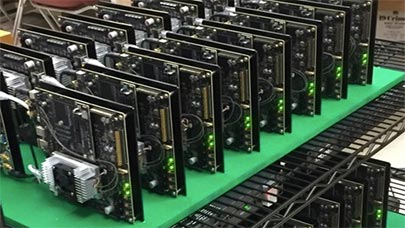
Industry Compute Cluster Enables Innovative Research and Development for Health and Life Sciences
February 28, 2022
University-purchased High Performance Computing (HPC) systems are typically funded to support principal investigators and their teams. But in 2014, the Center for Computational Research (CCR) at the University at Buffalo (UB) created a dedicated cluster to give businesses of Western New York access to large-scale computing resources they would either have to build on their own using public cloud services... Read more…

Alternative Supercomputing or How to Misuse a Computer
July 14, 2016
In 2008, the IBM Roadrunner supercomputer broke the petaflops barrier using the power of the heterogeneous Sony Cell Broadband Engine (BE) processor. A year prior, the Cell BE had already made its way into the consumer market as the engine inside the SonyPlaystation 3. The PS3's accelerated design, Linux-capability and low price point... Read more…

Univa Expands Grid Engine Support for Docker and Intel KNL
May 31, 2016
Univa today announced general availability of Grid Engine 8.4.0. The latest version of Grid Engine includes many new features including expanded support for Docker containers as well as “preview support” for Intel’s latest Xeon Phi code named Knights Landing processor. Univa also reports fixing more than 80 prior issues. Leading the container enhancements, users can now automatically dispatch and run jobs in Docker containers, from a user specified Docker image. Read more…

Penguin Computing Mines Commodity Gold
January 6, 2016
We recently sat down with Fremont, Calif.-based Penguin Computing to learn about the Linux cluster specialist’s unique approach to the HPC and hyperscale mark Read more…

NNSA Taps Penguin Computing for 7-9 Petaflops ‘Open’ HPC Cluster
October 21, 2015
Per a newly-inked contract with Penguin Computing, the Department of Energy’s National Nuclear Security Administration (NNSA) is set to receive its third join Read more…

Cray Details Its Cluster Supercomputing Strategy
July 28, 2015
When iconic American supercomputer maker Cray purchased 20-year-old HPC cluster vendor Appro in late 2012, Cray CEO Peter Ungaro referred to Appro's principal I Read more…

Purdue Lights Up Eighth Cluster in Eight Years
May 12, 2015
At Purdue, installing cluster computers is a tradition that inspires teamwork. The university’s central computing organization, Information Technology at Purd Read more…

Cluster Lifecycle Management: Capacity Planning and Reporting
May 8, 2015
In the previous Cluster Lifecycle Management column, I discussed the best practices for proper care and feeding of your cluster to keep it running smoothly on a Read more…

- Click Here for More Headlines

Whitepaper
How Direct Liquid Cooling Improves Data Center Energy Efficiency
Data centers are experiencing increasing power consumption, space constraints and cooling demands due to the unprecedented computing power required by today’s chips and servers. HVAC cooling systems consume approximately 40% of a data center’s electricity. These systems traditionally use air conditioning, air handling and fans to cool the data center facility and IT equipment, ultimately resulting in high energy consumption and high carbon emissions. Data centers are moving to direct liquid cooled (DLC) systems to improve cooling efficiency thus lowering their PUE, operating expenses (OPEX) and carbon footprint.
This paper describes how CoolIT Systems (CoolIT) meets the need for improved energy efficiency in data centers and includes case studies that show how CoolIT’s DLC solutions improve energy efficiency, increase rack density, lower OPEX, and enable sustainability programs. CoolIT is the global market and innovation leader in scalable DLC solutions for the world’s most demanding computing environments. CoolIT’s end-to-end solutions meet the rising demand in cooling and the rising demand for energy efficiency.
Download Now
Sponsored by CoolIT
Whitepaper
Transforming Industrial and Automotive Manufacturing
Divergent Technologies developed a digital production system that can revolutionize automotive and industrial scale manufacturing. Divergent uses new manufacturing solutions and their Divergent Adaptive Production System (DAPS™) software to make vehicle manufacturing more efficient, less costly and decrease manufacturing waste by replacing existing design and production processes.
Divergent initially used on-premises workstations to run HPC simulations but faced challenges because their workstations could not achieve fast enough simulation times. Divergent also needed to free staff from managing the HPC system, CAE integration and IT update tasks.
Download Now
Sponsored by TotalCAE
Advanced Scale Career Development & Workforce Enhancement Center
Featured Advanced Scale Jobs:
HPCwire Resource Library
HPCwire Product Showcase
© 2024 HPCwire. All Rights Reserved. A Tabor Communications Publication
HPCwire is a registered trademark of Tabor Communications, Inc. Use of this site is governed by our Terms of Use and Privacy Policy.
Reproduction in whole or in part in any form or medium without express written permission of Tabor Communications, Inc. is prohibited.
























